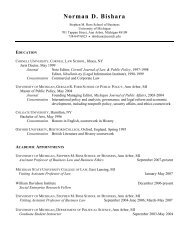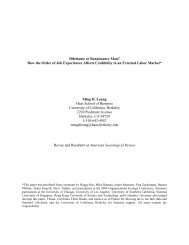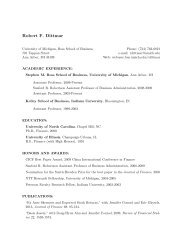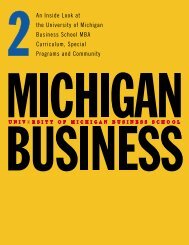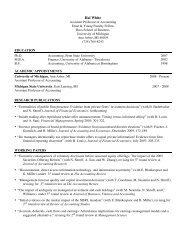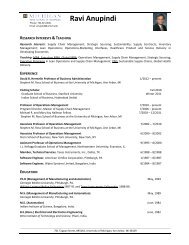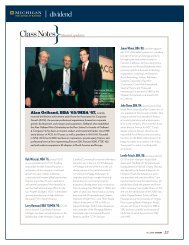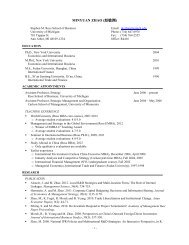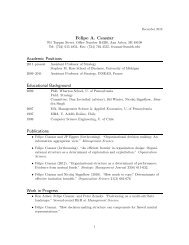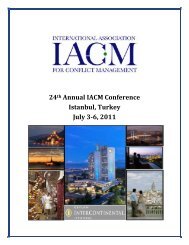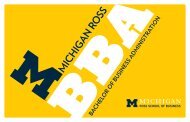DIvIDEnD - Stephen M. Ross School of Business - University of ...
DIvIDEnD - Stephen M. Ross School of Business - University of ...
DIvIDEnD - Stephen M. Ross School of Business - University of ...
Create successful ePaper yourself
Turn your PDF publications into a flip-book with our unique Google optimized e-Paper software.
photo by james bland<br />
a:<br />
Jeffrey Rich, BBA ’82, sees potential where<br />
others see panic. he co-founded the dallasbased<br />
investment firm PlumTree Partners<br />
llc in the throes <strong>of</strong> the economic downturn.<br />
“When the market started melting down<br />
in September 2008, I called my [current] partner<br />
and said, ‘Quit your job. now’s the time,’” Rich says.<br />
“I’ve never been able to make money with the herd.<br />
When everybody is running for the door, that’s the<br />
time to invest.”<br />
Rich and his partner Todd Furniss, former president and<br />
coo <strong>of</strong> management consulting firm everest group, could be<br />
called innovation hunters. they are combing the economic landscape<br />
for places where the recent crisis has spurred creativity<br />
and competitive advantage. they are looking to invest in mid-size<br />
firms, mostly in technology services, that are ready to take the next<br />
step — say from $10 million in revenue to $100 million.<br />
companies born from an entrepreneur’s brainstorm <strong>of</strong>ten hit a<br />
snag in that delicate segue from medium to large enterprise. some<br />
need more management discipline, some need contacts at bigger<br />
customers, and others need wholly new processes and systems. it’s<br />
one <strong>of</strong> the toughest transitions for most organizations, and it’s the<br />
sweet spot for Plumtree Partners.<br />
“the difference between $10 million in revenue and $100 million<br />
is night and day,” Rich says. “companies have to make an evolution<br />
every $100 million or so. you wonder why big firms have bureaucracy.<br />
it’s because they need it in some respects. But what’s necessary for<br />
large companies will kill a small company. you have to know what<br />
stage you’re in.”<br />
SEEK AnD DEPloY Rich developed his instincts for identifying innovation<br />
during his tenure as ceo <strong>of</strong> affiliated computer services<br />
(acs) from 1999 to 2005. acs is one <strong>of</strong> the largest business process<br />
outsourcing firms in the world. while growing the firm from $800<br />
million in revenue to $5.3 billion, acs kept tabs on the small, nimble<br />
entrepreneurs grabbing market share. Rich and his staff scouted and<br />
acquired several entrepreneurial competitors as a way to accumulate<br />
new ideas and products.<br />
“if we liked what they were doing long-term, we’d acquire them,”<br />
Rich says. “it’s probably more expensive to do it that way, but it’s<br />
safer. it’s like buying oil production instead <strong>of</strong> drilling new wells. i<br />
pay more, but i know for sure there’s oil in the ground.”<br />
Rich left acs intending to go into private equity. But he nixed<br />
the idea after concluding the field was over-funded. so he pursued<br />
the development <strong>of</strong> a late-stage investment fund with friend and<br />
colleague furniss. since founding Plumtree, the partners have<br />
focused on two primary targets: technology services and the emerging<br />
Brazilian market.<br />
“Running a large company is like running a battleship,” Rich<br />
says. “here, we can wake up every morning and shift gears if we<br />
want to. we get to choose what we want to do every day.”<br />
for now Rich is choosing the s<strong>of</strong>tware-as-a-service (saas) space<br />
because he sees cloud computing as the next big era in technology.<br />
the idea is that one can tap into a “cloud” <strong>of</strong> available computing<br />
services to fulfill both personal and business-related needs. instead<br />
<strong>of</strong> purchasing, installing, and hosting pre-packaged s<strong>of</strong>tware,<br />
companies will pay to access services from an <strong>of</strong>f-site host.<br />
to that end, Plumtree recently invested in Birchstreet systems,<br />
which runs a web-based purchasing program used by hotels,<br />
restaurants, and other hospitality businesses. Plumtree also invested<br />
in the saas company kudzu interactive, which automates<br />
take-out orders for the restaurant industry.<br />
WoRlD ViEW outside the u.s., Rich once again has distanced<br />
himself from the herd. while other investors chase opportunities in<br />
india and china, Plumtree is mining options in Brazil. the country<br />
is enjoying a period <strong>of</strong> economic stability and growth, is home to an<br />
expanding middle class, and hosts several multinational corporations.<br />
those corporations are going to need the support <strong>of</strong> service<br />
firms — just the kind <strong>of</strong> companies favored by Rich and furniss.<br />
through Plumtree, they formed an operating partnership with<br />
Performa Partners sa, a Brazilian investment firm that specializes<br />
in mid-size service companies facing challenges related to growth,<br />
strategy, restructuring, and mergers and acquisitions.<br />
“to me Brazil looks like the u.s. in 1990 or 1995, so we think<br />
we know how the story will play out,” Rich says. “Brazil has a very<br />
strong customer base, and consolidations will happen. it has been<br />
credit-starved and, from a technology perspective, it mostly has<br />
been following developments in the united states and asia. so we<br />
think Brazil is a long-term play for us. i like its economic future.”<br />
the partnership in Brazil is a good example <strong>of</strong> the differences<br />
between running one’s own fund and working in the c-level suite.<br />
Rich relishes the agility and freedom to align with players he feels<br />
will take Plumtree to the next level.<br />
“most innovation does not come from large corporations,” he<br />
says. “it comes from small, independent businesses or people<br />
unconstrained by the rules.” —Terry Kosdrosky<br />
spring 2010 <strong>DIvIDEnD</strong> 31



